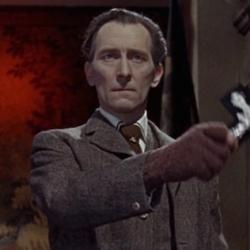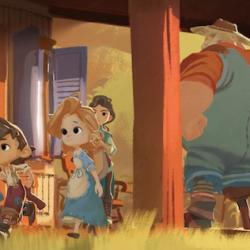Two fatherless boys – Will, a pious member of the Plymouth Brethren, and Lee, the school’s bully and bad boy – find stability and hope when they become blood brothers and make an amateur Rambo spin-off.
It’s a promising premise, but Son of Rambow doesn’t carry it off.
The problem is mainly with the characters. None of the main characters is remotely sympathetic. Lee is a spoiled rich kid, being raised by his older brother, who sends Lee off to make pirated videos of the latest feature films. Lee grows up during the film, and comes to see his older brother and his new friend Will are “all I’ve got,” but he’s still the bully and bad boy at the end.
Will’s accidental exposure to the Rambo film, First Blood , is his initiation into the world of entertainment, violence, and blood. He’s instantly hooked, and in his imagination leaves the Plymouth Brethren far behind. For the film, this is nothing but progress. He promises his mother that he will never betray the Brethren again, but when she leaves the room he instantly puts on his Rambow headgear. Apparently, there are some brotherly bonds that aren’t worth preserving.
Finally, his mother Mary sees the light too, sends her suitor Brother Joshua packing, and removes her head-covering. After her liberation, mother, daughter, and son Will cuddle in what is supposed to be a touching family moment. The film makes it clear from the outset that the Brethren are so out of touch (all the men leave their watches on a back table during worship – they are literally leaving the present).
Didier, the French foreign exchange student with the skunk-stripe hair, tight jeans, and bright red boots, makes all the English girls swoon. But he’s exposed as conceived, controlling, and ultimately, a coward. Yet the movie wants us to feel sympathy as he gets on the bus back to France and sits alone, despised by the other French kids. I didn’t feel sympathy; I found him annoying and unlikeable from the first.
The notion that fatherless boys might be seduced into adopting action figures as surrogate father figures is an interesting one, but the film never develops it. The only father figure in the film, Brother Joshua, is an intrusive disciplinarian, and when Mary kicks him out of the house, we hear a cheer arising from mother and children, and probably the elderly silent grandmother too (it’s a funny moment; the kids in class cheer every time Lee is kicked out). Will and Lee don’t need fathers; all they need is brotherhood.
There are some amusing scenes, but overall the film is a failure, and its anti-paternal “pro-family” sentimentalism is cheaply bought.










